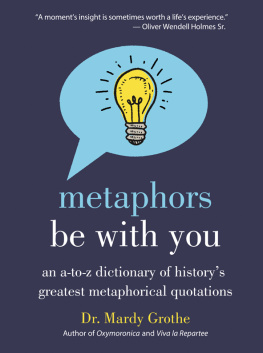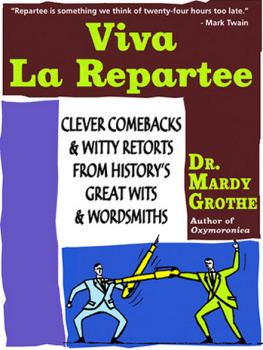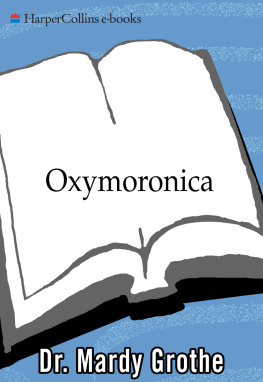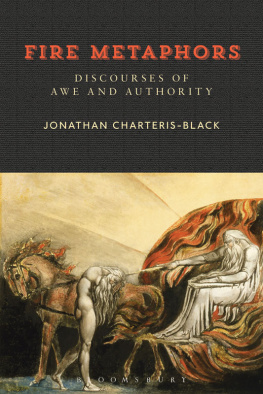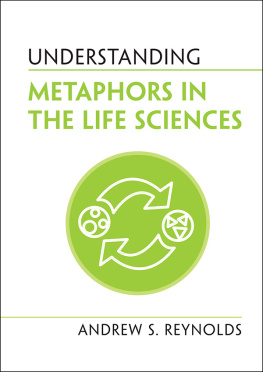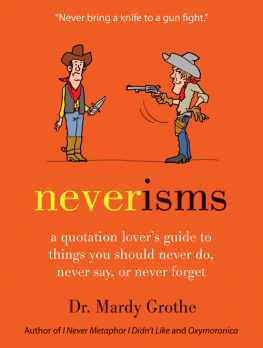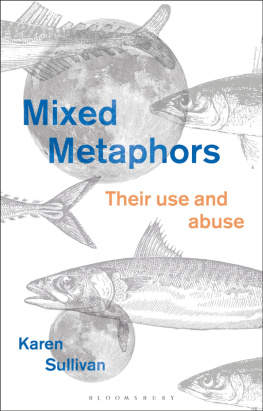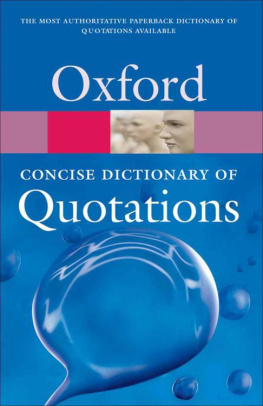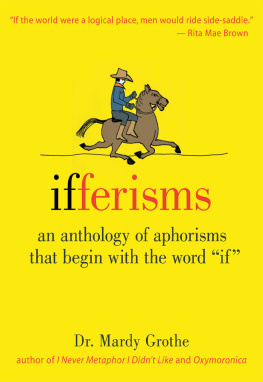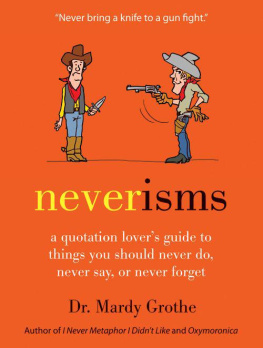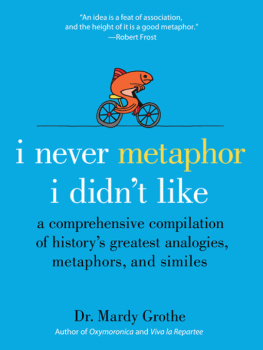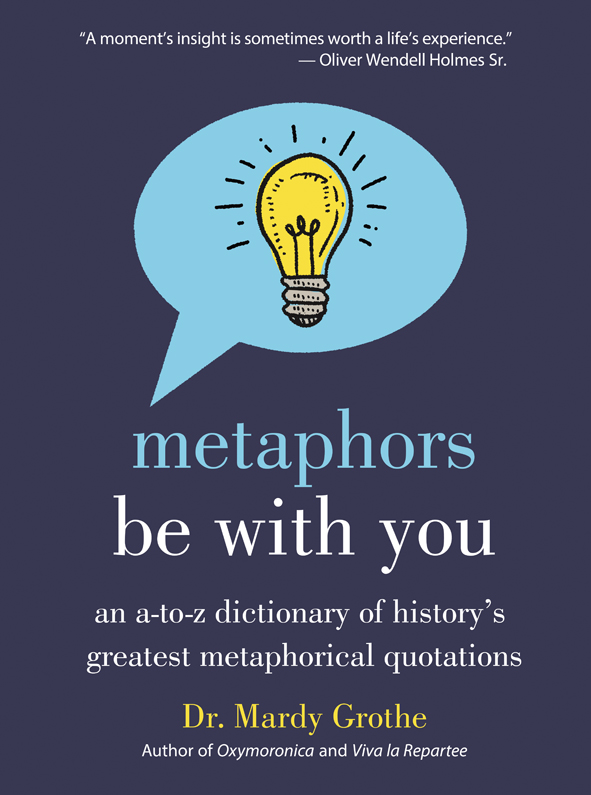To my Wombmate, and our Big Sister, who remind me of the truth of an Ann Hood observation: A sibling is the lens through which you see your childhood. contents
Guide
M ore than fifty years ago, my life was turned around by one of historys most famous metaphorical passages:
If a man does not keep pace with his companions,perhaps it is because he hears a different drummer.Let him step to the music which he hears,however measured or far away. HENRY DAVID THOREAU I was in the middle of what is now called an
identity crisis, and Thoreaus words were a lifeline. I didnt even know what a metaphor was at the time, but one of the best things about metaphors is that you dont have to know what they are to be moved by them. Youve probably experienced something similar in your life, for we are lost, and then were found is one of historys great themes. And when we
are found, its often because of soul-stirring words from writers whose thoughts have lived on in their works. Over the years, Ive often wondered how life might have turned out differently had I never come across that
Walden passage.
More recently, that thought spawned another: What if Thoreau had expressed his observation literally, not metaphorically? Writing instead something like: Certain individuals are different from most other people,
and it is good that this is the way things are. The core of Thoreaus message is the same, but had it been phrased this way, I dont believe I wouldve been moved. And that prospect stimulated another thought: What if the device of metaphor had not even been available to Thoreau?
A WORLD WITHOUT METAPHOR
People rarely think about electricity when they flick on a light switch, and something similar occurs with metaphorical language. In everyday communication, people rarely think about the powerful role metaphor plays in their lives. With electricity, though, an occasional power outage jars our attention and reveals our dependence. What if we experienced a metaphor outage? What
would life be like in a world without metaphor? Your first thought might be that life would be bleak, or maybe barren. Sadly, though, you cant say things like that during a metaphor outage.
In a world without metaphor, you can legitimately describe a physical terrainlike a desert or a coastlineas bleak or barren, but life is not a tangible thing. Life cannot be seen or touched or felt; it is a concept that exists only in our minds. When we take terms that are literally appropriate for physical objects and apply them to concepts and ideas, we are engaging in an act of metaphor. Describing life as empty or impoverished would also be disallowed in a world without metaphor for the same reason. While one can literally describe a container as full or empty, or a person as wealthy or impoverished, a concept like life can be described in those ways only when we make the move from literal to figurative language. When we say that people are speaking figuratively, we mean they are using figures of speech to describe things and convey ideas.
A defining characteristic of all metaphorical language is that it is literally false. When we employ the metaphor time is money, for example, we know its not truly the case, but it so perfectly captures our experience of time that we say it is figurativelyas opposed to literallytrue. Time is money is also relevant to our discussion of a world without metaphor. Not long after Ben Franklin first introduced it (Remember that time is money) in Advice to a Young Tradesman (1748), the metaphor burrowed so deeply into the nations consciousness that aspects of it began showing up in everyday phrases and expressions. The notion that money can be wasted resulted in sayings like Youre wasting my time or He wasted his life away. The fact that money can be spent resulted in sayings like He spent a ton of time on that project or Come, spend a little time with me.
While none of these sayings would be described by the average person as metaphorical, they all derive from the original time is money sayinga metaphor that forms the foundation of hundreds of other expressions, including saving time, investing time, budgeting time, running out of time, and even living on borrowed time. None of these sayings, of course, would be possible in a world without metaphor. In More Than Cool Reason: A Field Guide to Poetic Metaphor (1989), George Lakoff and Mark Turner remind us: Metaphor isnt just for poets;
its in ordinary language and is the principal way we have
of conceptualizing abstract concepts like life, death, and time. I could easily list a thousand other things you couldnt say in a world without metaphor. To highlight only a few, you couldnt capture someones interest, fall head over heels in love, or break another persons heart. You couldnt rise to the occasion, dodge a question, or spring to action. You couldnt close the book on a difficult period in your life, or begin a new chapter.
You couldnt chase your dreams, hold a belief, seize the day, or even think about the pursuit of happiness. In a world without metaphor, human communication would be crippled. And writers like Thoreau would be seriously hampered in their ability to help struggling young people find their way in the world. Happily, though, we do live in a world of metaphor. And because we do, great writers and thinkers have been able to craft words that have the ability to inspire and empower. Aristophanes described the phenomenon beautifully in The Birds (fifth century BC): By words the mind is winged. Think back over your own life and try to recall quotations that were instrumental in shaping the person youve become.
They were very likely expressed metaphorically, and they might have included one of these: Ah, but a mans reach should exceed his grasp.
Or whats a heaven for? ROBERT BROWNING Make no little plans; they have no magic to stir mens blood. DANIEL BURNHAM To be nobody-but-yourselfin a world which is doing its best,
night and day, to make you everybody elsemeans to fight
the hardest battle which any human being can fight, and never stop fighting. E. E. CUMMINGS Two roads diverged in a wood, and II took the road less traveled by,
And that has made all the difference. ROBERT FROST In this book, I survey the grand landscape of metaphorical quotations andlike a museum curator judging masterpieces of artselect the very best things that have ever been said on two-hundred and fifty topics of deep human interest. Before all that, though, lets start at the beginning.
WHAT IS A METAPHOR?
The
American Heritage Dictionary defines metaphor this way:
A figure of speech in which a word or phrase that ordinarily designates one
thing is used to designate another, thus making an implicit comparison, as
in a sea of troubles or All the worlds a stage. The word
metaphor derives from two ancient Greek roots:
meta, meaning over, across, beyond, and
pheiren, meaning to carry, transfer. The root sense of the word is to carry something across from one conceptual domain to another.
Metaphor is an intellectual tool that allows us to make imaginative leaps. We know, for example, that the world is not literally a stage, but we give it such a name to make it more comprehensible. Aristotle had a lovely way of describing this process: Metaphor consists in giving the thing a name that belongs to something else. The American Heritage Dictionary definition says a metaphor is an implicit comparison. This unusual term is used for one reason, and one reason only: to distinguish it from a simile, which makes an explicitor directcomparison. Well come back to similes a bit later, but I bring this up now because implied comparison is the

